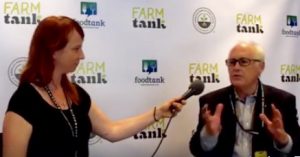Michael R. Dimock interviewed by Santa Barbara News Station on Sugar Sweetened Beverage Tax Bill
April 21, 2017 Roots of ChangeYou can see the full story on Channel 3 News KEYT Santa Barbara.
Interview with Michael R. Dimock at Food Tank Summit
September 22, 2016 Roots of ChangeInterview with Michael R. Dimock at the Food Tank Summit (by Bridget Huber).
Sacramento, CA, September 22, 2016.
You can read the full story on Food Tank.
Interview with Michael R. Dimock and Nicolette Hahn Niman on Capital Public Radio
September 21, 2016 Roots of ChangeInterview by Beth Ruyak, Capital Public Radio, with Nicolette Hahn Niman (Niman Ranch) and Michael R. Dimock (Roots of Change), September 21, 2016.
You can listen to the full story on Capital Public Radio.
Farm to Table Talk Interview with Michael R. Dimock
September 20, 2016 Roots of ChangeFarm to Table Talk interview with @MichaelRDimock related to the food movement (by Rodger Wasson). What is it? How did it begin and grow? Where is it today? Michael puts the focus on the need for more effective policy work by connecting grass roots communities to policy organizations working the halls of capitol buildings across the land.
https://soundcloud.com/farmtotabletalk/movemental2
You can read the full story on Farm to Table Talk.
The Presidential Candidates Still Aren’t Talking About Our Food Supply
September 13, 2016 Roots of ChangeThe food we eat matters for our economy, our health and our environment. Do Clinton or Trump agree?
If the two major party candidates for president care about our nation’s food supply, they certainly aren’t doing much to indicate that.
About six months ago, The Huffington Post sent a list of eight questions concerning food and agricultural policy to all the Republican and Democratic campaigns. We received no responses.
Since then, of course, the field of contenders has winnowed to Democratic nominee Hillary Clinton and Republican nominee Donald Trump. But when it comes to what the candidates have said concerning hunger, nutrition, GMO labeling or sustainable agriculture, little has changed.
Celebrity chef Tom Colicchio says he thinks the candidates’ virtual silence on these issues is unacceptable, but it’s not surprising given the tone of the race.
You can read the full story in the Huffington Post.
Cities Hire Food Systems Experts To Address Obesity, Food Access
August 22, 2016 Roots of ChangeAt least 22 cities, from Baltimore to Denver, have created leadership roles for change-makers focused on food.
Standing at the front of a dimly-lit room inside the National Western Stock Show, a sprawling complex on the north end of Denver, Blake Angelo, the city’s food systems development manager, invited a roundtable audience to speak up about the changes they want to see in their neighborhoods with regard to food. The room was filled with residents of nearby neighborhoods that are predominantly Hispanic, low-income, and where fresh food is hard to come by, and the opinions ranged from support for local entrepreneurs to rejecting big-box stores as the solution to their food desert problem.
Citywide, one in six people is food-insecure, but as in other cities, some communities face more acute challenges than others. Nearly half (49 percent) of the low- to moderate-income Denver neighborhoods lack convenient access to grocery stores. In the larger metro region, about five percent of the population is low-income and has little access to healthy food within a mile from home; in Elyria-Swansea, one of the nearby neighborhoods, that number jumps to 70 percent.
You can read the full story on Civil Eats.
Ten Questions with Michael Dimock, President of Roots of Change
August 8, 2016 Roots of ChangeFood Tank had the chance to speak with Michael Dimock, President of Roots of Change, who will be speaking at this year’s Farm Tank Summit in Sacramento.
Food Tank (FT): What inspired you to get involved in food and agriculture?
Michael Dimock (MD): The realization in 1988 that the food system was the foundation of civilization and that if we did not get it right in terms of sustainable principles and practices, nothing else really mattered, because the human pursuit of sustenance was destroying the resource base and exploiting developing nations and the people that work the land.
You can read the full story at Food Tank.
A nutrition program California should stop starving now
June 3, 2016 Roots of ChangeLast year, California passed a modest bill that should have been a no-brainer. The California Nutrition Incentives Act set up a program to discount fruits and vegetables for CalFresh shoppers at farmers markets and farm stands.
Like the wholesome produce it was aimed at, the new program had ridiculous upsides: Healthier food for low-income families. More business for small farmers. Rural jobs. Matching federal dollars. An established pilot with a solid, years-long track record tied neatly to California’s version of food stamps.
All that remained was a little state money to attract matching funds authorized by the 2014 Farm Bill when, at the last minute – in a fit of fiscal restraint or low blood sugar, we aren’t sure which – state lawmakers and Gov. Jerry Brown blanked the appropriation.
You can read the full story in the Sacramento Bee.
California Assemblyman Proposes Soda Tax
March 17, 2016 Roots of ChangeBAKERSFIELD, Calif. (KBAK/KBFX) — In an attempt to combat high rates of obesity and diabetes in California, a lawmaker from Santa Monica announced Wednesday he is introducing bill that would tax sugary drinks.
It’s the seventh bill in the last six years designed to tax or add warning labels to sodas and other beverages with high sugar content. But, so far, none of them have become law.”Sugary beverages have no nutritional value,” said Assemblyman Richard Bloom, who is sponsoring the bill. If passed, it would impose a 2-cent-per-ounce tax on sugary drinks.
“Liquid sugar, when it enters the body, goes straight to the pancreas and then it’s converted to fat,” he warned at a press conference in Sacramento.
You can read the full story on Bakersfield Now.
Soda Tax Is Again Before California Legislators
Roots of ChangeCalifornia lawmakers have again introduced legislation to impose a fee on sodas and other sugary beverages — not a true tax, but a “health impact fee” to be paid by beverage distributors.
Still, the presumption is that the two-cents-an-ounce fee — 24 cents on a 12-ounce can of soda — would be passed along to consumers, and, if passed, would raise $2 billion annually. “That’s real money,” said the legislation’s author, Assemblymember Richard Bloom, D-Santa Monica.
The revenue would go into a “Healthy California Fund,” to be created by the bill. From there it would be spent on public health programs across the state, to fight obesity, diabetes and dental disease.
You can read the full story on KQED News.

